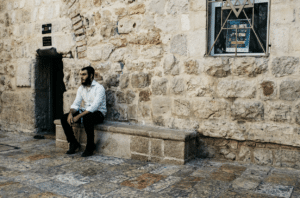Eid al-Adha literally means “The Feast of the Sacrifice” in Arabic. The story in which Abraham is asked by God to sacrifice his son is known as the “Akeda” in Hebrew, which means “the binding” in English, but did you know that Muslims believe it was not Isaac who Abraham was asked to sacrifice, but Ishmael? In the Bible, the story is found in Genesis 22. Here’s how the scene is set:
Some time later God tested Abraham. He said to him, “Abraham!”
“Here I am,” he replied.
Then God said, “Take your son, your only son, whom you love—Isaac—and go to the region of Moriah. Sacrifice him there as a burnt offering on a mountain I will show you.” (Genesis 22:1-2)
The Switched Sacrifice
For Muslims, Eid al-Adha is all about Ishmael, not Isaac. However, unlike the Bible, the text of the Quran (written two thousand years later) does not specifically say which son was sacrificed. Here’s how the story is told in the Quran:
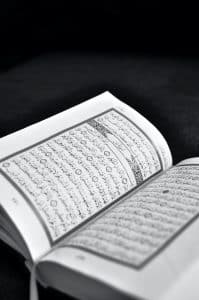 “Then, when he was old enough to accompany him, he said, “O My son, I see in a dream that I am sacrificing you; see what you think.” He said, “O my Father, do as you are commanded; you will find me, God willing, one of the steadfast.” Then, when they had submitted, and he put his forehead down. We called out to him, “O Abraham! You have fulfilled the vision.” Thus We reward the doers of good. This was certainly an evident test. And We redeemed him with a great sacrifice. And We left with him for later generations. Peace be upon Abraham.” (Quran chapter 37:102-109)
“Then, when he was old enough to accompany him, he said, “O My son, I see in a dream that I am sacrificing you; see what you think.” He said, “O my Father, do as you are commanded; you will find me, God willing, one of the steadfast.” Then, when they had submitted, and he put his forehead down. We called out to him, “O Abraham! You have fulfilled the vision.” Thus We reward the doers of good. This was certainly an evident test. And We redeemed him with a great sacrifice. And We left with him for later generations. Peace be upon Abraham.” (Quran chapter 37:102-109)
Muhammed believed he was descended from Ishmael and so this story, penned 150 years after Muhammed’s death in 632 AD, is reimagined to have Ishmael as the son that Abraham was asked to sacrifice. Note too that unlike the biblical text, Abraham’s son is consulted, and willing to surrender his life—even offering himself by getting into position with his forehead down. The Quran typically paints its heroes as perfect saints with none of the complications found in the more brutally honest Bible. The Hebrew Scriptures represent characters like Abraham, Isaac, and Jacob with all their flaws and failures, as well as their faith and moments of victory. The dysfunctional family of Abraham and the obvious estrangement of father and son in the wake of such a traumatic event aren’t so obvious the Quran. In the Bible the Akeda, the binding of Isaac, was a test of Abraham not Isaac. And he passed with flying colors. The Quran also recounts the story as a test of Abraham, but the star of the show seems to be the son who willingly offered his life as a sacrifice. In contrast, you get the distinct impression in the Bible that Abraham’s beloved son was not aware of the plan until it was all too late, and it records that while Abraham went back to Beersheva, Isaac then left for Beer Lahai Roi where he then lived separately for several years (Genesis 24:62). It’s a powerful but hard story.
How Eid Al-Adha is celebrated
Eid al-Adha has many names, including “the Great Feast”, “the Feast of Sacrifice”, “the Feast of oblation” and “the Feast of Hajj”. It is one of the most important festivals in the Muslim calendar, and follows Eid al-Fitr at the end of the month of Ramadan. Ceremonies begin a day after the pilgrims stand on Mount Arafah (also known as Jabal ar-Raḥmah) which is some 20 kilometers from Mecca in Saudi Arabia. The feast begins on the morning of the tenth of the month of Dhu al-Hijjah with a prayer called the Eid prayer, and then Muslims begin to offer animal sacrifices to God, slaughtering animals of five types: camels and cows of two kinds, along with sheep and goats. Sometimes people in the community lay hands on the animal to be killed, to symbolize the transfer of sins onto the animal before it is sacrificed, hoping to gain atonement through the blood. This practice is similar to the instructions God gave the Israelites for the Day of Atonement in which the priest lays hands on the goats to impute the sin to the goat, before sending it off into the wilderness. It should perhaps not be surprising that there are similarities of this type, since many stories in the Quran are loosely based on the Bible. However, although it contains many of the same characters and stories, the Quran tells a very different narrative with very different meanings.
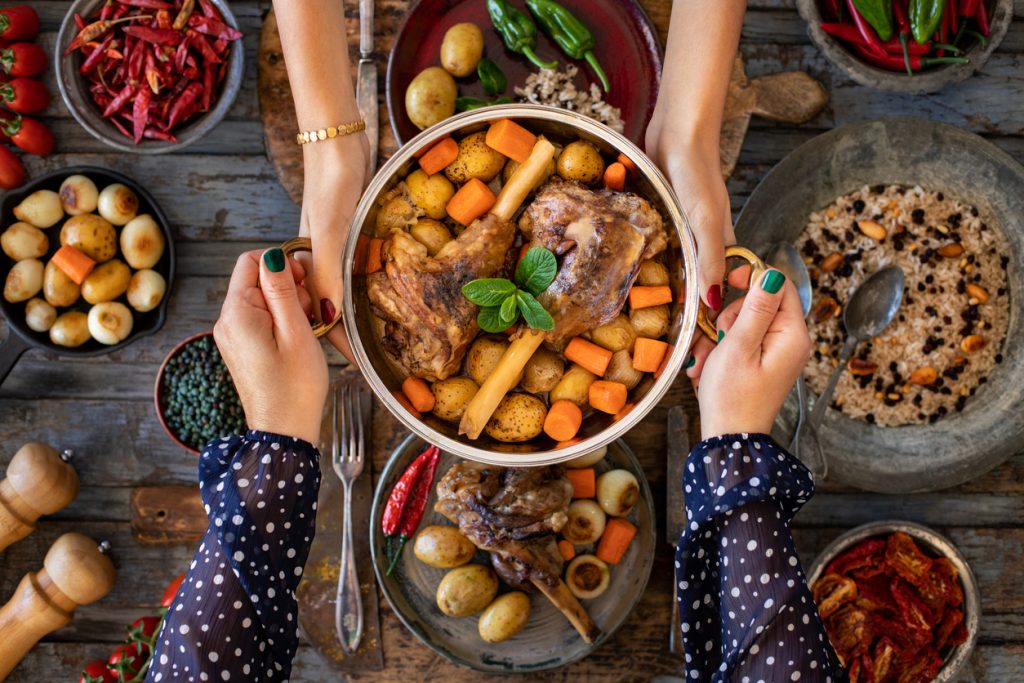
This slaughter of Eid Al-Adha continues for four days, ending in the afternoon of the fourth day. The days of this feast are characterized by public “takbeers”, chanting the Arabic phrase ʾAllāhu ʾakbarᵘ, meaning “God is greater” (the word takbeer stands for “God is greater than all”). In this way, Muslims declare God’s greatness in all places, and exchange gifts and visit one another, as well as seeking to give help to the disadvantaged and the poor.
Muslims observe two rulings regarding the sacrifices of Eid al-Adha: Firstly, the act of animal sacrifice is said to be an act of getting closer to God through the slaughtered animal and in compliance with his command. Every capable Muslim is to present a sacrifice to Allah in order to get closer to him. In Muslim majority countries it is common for countless animals to be killed at this time, and the blood flows freely, as it must have done in the time of the Jewish sacrificial system. Secondly, the sacrifice is a ransom offered by the head of the family on behalf of his children, in commemoration of the time that God provided Abraham with a ram to slaughter instead of his son Ishmael (according to Islamic belief). It is also common for Eid Al-Adha to be closely associated with the Hajj, which is a pilgrimage to Mecca—something that all Muslims are expected to attempt in order to gain a better standing with Allah and a greater chance at escaping punishment for sin.
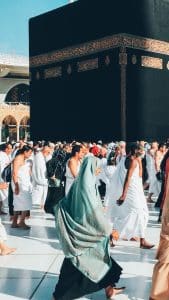 So you can see that there are some overlapping themes between this Islamic feast of the sacrifice and the sacrifices commanded in the Bible. The theme of atonement for sin by blood sacrifice is one example, but both Jewish and Muslim people most often miss the message of Abraham’s sacrifice. The whole point was that God provides the lamb as a substitution, to die in Isaac’s stead. This foreshadows the promised Messiah, Jesus, the Lamb of God, who would take away the sin of the world. There is no need for us to fear God’s punishment—we have been offered forgiveness and eternal life through the sacrifice of the perfect Messiah, who paid the price for our sin. In countries where Muslims are in a minority, they are usually not allowed to sacrifice animals in their own households, and similarly the Jewish people have opted for a much more sanitized version of the sacrificial system nowadays, believing that prayer will do instead. But the Bible warns us,
So you can see that there are some overlapping themes between this Islamic feast of the sacrifice and the sacrifices commanded in the Bible. The theme of atonement for sin by blood sacrifice is one example, but both Jewish and Muslim people most often miss the message of Abraham’s sacrifice. The whole point was that God provides the lamb as a substitution, to die in Isaac’s stead. This foreshadows the promised Messiah, Jesus, the Lamb of God, who would take away the sin of the world. There is no need for us to fear God’s punishment—we have been offered forgiveness and eternal life through the sacrifice of the perfect Messiah, who paid the price for our sin. In countries where Muslims are in a minority, they are usually not allowed to sacrifice animals in their own households, and similarly the Jewish people have opted for a much more sanitized version of the sacrificial system nowadays, believing that prayer will do instead. But the Bible warns us,
“Under the law [Torah] almost everything is purified with blood, and without the shedding of blood there is no forgiveness of sins.” (Hebrews 9:22).
It is by the shed blood of Jesus that we can know for certain we are saved. This is what the sacrifice asked of Abraham was all about. This is the price our Father in heaven paid for us: He gave His only Son as a sacrifice for us.
“For God so loved the world, that he gave his only Son, that whoever believes in him should not perish but have eternal life. For God did not send his Son into the world to condemn the world, but in order that the world might be saved through him. Whoever believes in him is not condemned, but whoever does not believe is condemned already, because he has not believed in the name of the only Son of God.” (John 3:16-18)
Ishmael and Isaac were both beloved
When God tells Abraham to take his son, his only son, the son he loves, you can imagine how a child of Ishmael might wince when Isaac is named, not Ishmael. This might be part of the reason Eid al-Adha focuses on Ishmael even though he’s not even in the Quranic story. But the truth is that Ishmael was also loved by Abraham, and more than that, God tells Abraham to sacrifice Ishmael too, albeit in a different manner. Hear Abraham’s heart for his son Ishmael:
And Abraham said to God, “If only Ishmael might live under your blessing!”
Then God said, “Yes, but your wife Sarah will bear you a son, and you will call him Isaac.” (Genesis 17:18-19)
Ishmael was also blessed by God, and became the ancestor of many kings and peoples. But if you remember, he almost didn’t make it. He almost died as a young lad.
Just as God told Abraham to take Isaac and sacrifice him as a burnt offering, so God told Abraham to send Hagar and Ishmael away. In the very chapter before the binding of Isaac we see a different sacrifice made by Abraham—but this time it was giving up his son Ishmael.
The language used is so similar in the parallel passages that we need to understand that the two stories are connected:
Early the next morning Abraham took some food and a skin of water and gave them to Hagar. He set them on her shoulders and then sent her off with the boy. She went on her way and wandered in the Desert of Beersheba. When the water in the skin was gone, she put the boy under one of the bushes. Then she went off and sat down about a bowshot away, for she thought, “I cannot watch the boy die.” And as she sat there, she began to sob. God heard the boy crying, and the angel of God called to Hagar from heaven and said to her, “What is the matter, Hagar? Do not be afraid; God has heard the boy crying as he lies there. Lift the boy up and take him by the hand, for I will make him into a great nation.” (Genesis 21:14-18)
Here is some of the Isaac passage for comparison:
Early the next morning Abraham got up and loaded his donkey. He took with him two of his servants and his son Isaac. When he had cut enough wood for the burnt offering, he set out for the place God had told him about. On the third day Abraham looked up and saw the place in the distance. He said to his servants, “Stay here with the donkey while I and the boy go over there. We will worship and then we will come back to you.” (Genesis 22:3-5)
The two stories show that both boys were precious to their father Abraham, and both are precious to God. However, God refers to Isaac as Abraham’s “only” son. Why?
God’s great sacrifice
God always goes with plan A. We often make a mess and fail to follow through with God’s stated plans, but you can’t derail God’s established plans. He had said that Abraham and Sarah would have a son together, however ridiculous and impossible it seemed, and that’s exactly what happened. God’s original plan continued no matter how many years they waited (about 25 years in the end) or whatever else happened along the way. As Job confessed at the end of his testing:
“I know that you can do all things, and that no purpose of yours can be thwarted.” (Job 42:2)
Impossible is nothing to God. Unable to imagine the miracle, Sarah suggested Abraham should take Hagar, their Egyptian maidservant, and the rest is history. Now there are many more people for God to love, a whole new nation for Him to bless, and cousins for the people of Israel. But God’s plan to work through Isaac to bring the blessing and the promise remained unchanged. He did exactly as He promised in order to establish His plan of salvation for the whole world. It is through Isaac and Jacob that the promises came: the twelve tribes of Israel and the promised Messiah who would be sacrificed for the sins of the world—for Jews and Arabs alike. Now anyone who calls on the name of the Lord can be saved.
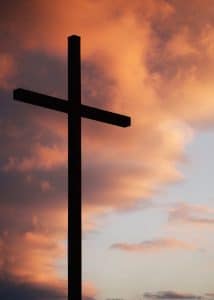
If you confess with your mouth that Jesus is Lord and believe in your heart that God raised him from the dead, you will be saved. For with the heart one believes and is justified, and with the mouth one confesses and is saved. For the Scripture says, “Everyone who believes in him will not be put to shame.” For there is no distinction between Jew and Greek; for the same Lord is Lord of all, bestowing his riches on all who call on him. For “everyone who calls on the name of the Lord will be saved.” (Romans 10:9-13)
How will Muslims hear about this great news? Someone has to tell them! Our Arabic outreach team work tirelessly to take the Gospel to all who will listen, and many are responding. Please pray for Muslims in Israel and around the world at this time of Eid al-Adha: pray that millions, yes millions will call on the name of the One who died for them, and be saved.
Photo by Moaz Tobok on Unsplash












